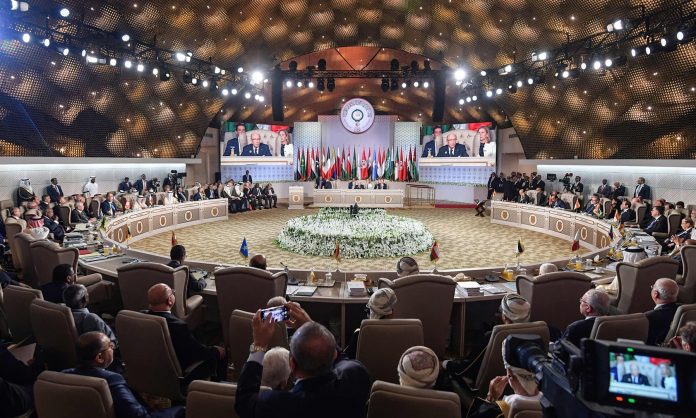
Arab leaders papered over long-running regional rivalries on Sunday to condemn a US move to recognise Israel’s sovereignty over the Syrian Golan Heights and said stability in the Middle East hinged on creating a Palestinian state.
Arab leaders, attending a summit in the Tunisian capital, have been grappling with regional splits over Iran’s influence in the Middle East, a bitter Gulf Arab dispute, international pressure over the war in Yemen and unrest in Algeria and Sudan.
But they have found a reason to unite against President Donald Trump’s decision to sign a proclamation last week recognising the Golan Heights as part of Israel, which annexed the area in 1981 after capturing it from Syria in 1967.
It follows a US move less than four months ago to recognise Jerusalem as Israel’s capital, a decision that also prompted Arab condemnation. Palestinians want East Jerusalem as the capital of a future state in the West Bank and Gaza.
Saudi Arabia’s King Salman bin Abdulaziz told Arab monarchs, presidents and prime ministers at the start of the summit that his country “absolutely rejects” any measures that affect Syria’s sovereignty over the Golan Heights.
His remarks echoed those of senior Arab officials before Sunday’s summit of the Arab League, which usually ends with a final declaration agreed by the 22 member states.
Tunisian President Beji Caid Essebsi said Arab leaders also needed to ensure the international community understood the importance of the Palestinian cause to Arab nations.
Regional and international stability should come through “a just and comprehensive settlement that includes the rights of the Palestinian people and leads to the establishment of a Palestinian state with Jerusalem as its capital,” Essebsi said.
UN Secretary-General Antonio Guterres, who addressed the meeting in Tunis, said any resolution to the Syrian conflict must guarantee the territorial integrity of Syria “including the occupied Golan Heights”.
Rifts remain
Summit spokesman Mahmoud Al-Khmeiry had said before the summit that Arab states would also repeat a call offering peace with Israel in exchange for occupied Arab lands and would reject any initiative not in line with UN resolutions.
Khmeiry appeared to be referring to a still-unannounced US peace plan by White House adviser Jared Kushner and Trump son-in-law that Palestinians have refused to discuss.
Despite a show of unity in rejecting US initiatives that support Israeli policies, Arab states remain divided over a range of other issues, including pro-democracy protests that have erupted in the region since 2011 and over Iran’s Middle East influence.




